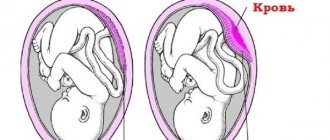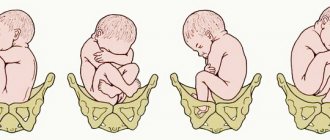Interesting Facts
| Options | Indications |
| Time from conception | 24 weeks |
| Period by month | 26 weeks |
| What month | 6 |
| Dimensions and weight of the fetus | 350 mm, 760 g |
| Uterus dimensions | At the middle of the distance between the navel and the xiphoid process, IMD - 23-26 cm |
| Pregnant weight | Gain from the beginning of pregnancy is 7-10 kg; over the last week no more than 400-500 g |
Your baby is the size of
Cantaloupe Melon
350mm Size
760 g Weight
At this stage, you probably regularly feel fetal movements and can even see them. These are amazing sensations that fill the expectant mother with peace and love. The baby is actively growing, you are gaining weight and therefore may feel uncomfortable. A duck's gait, smoothness in movements and some clumsiness appear. This week your unborn baby will open his eyes for the first time. They are already able to discern light through the abdominal wall. What else is important and you need to know about the 26th week of pregnancy?
Fetus. Development at 26 weeks
Fetal development at 26 weeks of pregnancy
By the 26th week of pregnancy, the unborn baby achieves great success in its development: almost all life-support systems are formed, weight reaches from 700 to 1000 g, height - from 35 to 37 cm. 6 months have passed since conception, and every day the baby becomes stronger and stronger.
Every day, many processes occur in the body of the unborn baby, preparing him for life outside the mother’s womb. Very soon the chances of survival if born early will be encouraging, but for now they are within 50/50.
Babies born at 26 weeks are classified as extremely low birth weight infants, and nursing them requires a lot of effort, and it is very difficult to avoid further health complications. Therefore, it is important for the expectant mother to strive to maintain her pregnancy as long as possible so that important preparations for life outside her body are completed.
At the 26th week of pregnancy, the nervous and respiratory systems develop most actively.
The final stages of formation take place in the brain; each of the millions of cells learns its functions and learns to work correctly. This process is facilitated by active myelination (coating each neuron with myelin). Information transmitted between nerve cells is an electrical impulse. To prevent it from damaging the structure of the neuron, a protective myelin sheath is built around the nerve cell. The weight of neurons by the 26th week is more than 100 g, the total volume by birth will reach from 340 to 430 g, mainly due to an increase in the amount of myelin.
This week, the unborn baby is actively developing his thinking. The foundations of memory begin to be laid in the brain. The baby learns not only to distinguish taste, sound and sensations, but also to remember them.
The functioning of the areas of the brain responsible for sensory receptors improves. This week, the baby not only opens his eyes, but also sees light with them. Vision still needs to improve until birth and for several years after.
Hearing continues to develop. This week the functioning of sound receptors is improved. The baby can already distinguish some sounds, of which the mother’s voice and the beating of her heart are the most beloved. After birth, when the baby is worried or crying, you can calm him down by holding him to the breast and talking calmly to him.
The perception of tastes is improved. Sweet and salty, bitter and sour, consumed by the mother, are already recognized by the baby. Depending on the taste of what is eaten, the amniotic fluid changes, and the fetus can often tell the expectant mother whether he likes it. By this stage of pregnancy, most women can already recognize the baby’s opinion about food by the force of the foot hitting the wall of the uterus.
By the 26th week of pregnancy, the fetus has established a rhythm of sleep and wakefulness. He sleeps about 18 hours a day, waking up every 4 hours. During periods of wakefulness, it actively moves, which is well felt by a woman. In most cases this week, babies are positioned head down, so leg kicks are felt in the area of the diaphragm and lungs.
Connections continue to form between different organs. At this stage, thanks to the establishment of joint work of the brain and adrenal glands, the correct hormonal levels are established in the fetus.
The 24th embryonic week is the time of active weight gain by the child. Most of the acquired grams are developing muscles and developing subcutaneous fat. This process improves the mobility of the entire skeleton of the unborn child, allowing him to toss and turn, kick his legs and move his arms more skillfully.
Increased muscle volume and subcutaneous fat smooth out previously wrinkled body skin. The cheeks on a ready-made face become plumper. If you examine the fetal face using an ultrasound machine, you can clearly see the features with which the baby will be born.
The skeleton of the future baby becomes stronger. Almost all large bones have already stored the required amount of calcium, but the process of bone tissue formation has not yet been fully completed. It will continue throughout pregnancy and after birth.
Basic life support systems are operating at full capacity. The four-chambered heart grows along with the baby, beating up to 150 times per minute. This high heart rate (HR) will be observed until birth and will begin to gradually decrease only towards the end of the first year of life. Heart rate will reach adult levels only at the end of adolescence.
The gastrointestinal tract is actively working, processing amniotic fluid swallowed by the fetus. By breaking it down into sugars and water, the food system sends nutrients into the body, excreting waste materials through the kidneys (in the form of urine) or depositing solid waste in the intestines. The accumulated processed substances will leave the baby’s body after birth in the form of meconium (original feces). It will be almost black or dark green.
By the 26th week of pregnancy, the respiratory system remains the least developed. At this time, the formation of the lung form is completed. They become familiar triangular. They undergo the process of formation of alveoli (tiny bubbles responsible for gas exchange) and alveolar ducts. The number of alveoli necessary for life will be formed by the 32nd week of pregnancy.
To ensure that the lungs expand at the time of birth and the walls of the alveoli do not stick together, surfactant is actively produced in the fetal body. There is still very little of it to cover the walls of all the alveoli, so when a baby is born prematurely, the administration of this substance is often required as part of medical care.
By this week of pregnancy, the intrauterine development of the reproductive system of the unborn child is completed. For girls, the vagina, fallopian tubes, uterus, and external genitalia are almost ready. In boys, the process of descent of the testicles into the scrotum begins.
Feelings of the expectant mother
At 26 weeks of pregnancy, the normal weight gain is 7 kg. The fundus of the uterus is located 6 cm above the navel. It puts more and more pressure on the diaphragm, making breathing difficult. For the same reason, a woman feels heartburn.
The body experiences a double load, so you may often feel drowsiness, fatigue and weakness. Take care of yourself, try to get enough sleep and rest during the day. Maternity leave is coming soon, and it will be easier to do this.
A mucus plug forms in the cervix, the function of which is to protect against infections. Vaginal discharge may become heavier. Normally, they should be light, have a uniform consistency and a neutral odor. Curdled or purulent discharge is an urgent reason to consult a doctor.
Many women experience what is called “nesting syndrome.” I want to decorate my home, change the curtains and buy everything I need for the birth of my baby. This is a natural state established by nature. At this time, it is important to protect the expectant mother from emotional and physical stress.
Baby development
The changes that occurred with the baby during the 2nd trimester of pregnancy are impressive:
- internal organs are formed;
- facial features appeared;
- he hears well and knows how to distinguish taste;
- his movements are coordinated;
- a daily routine appeared, including periods of sleep and wakefulness.
The average weight of a baby at 26 weeks of pregnancy is 760 grams. The amount of subcutaneous fat is rapidly increasing, thanks to which the child no longer looks thin, as it did just a couple of weeks ago. The average height is 35 cm. The skeletal system continues to strengthen, so the baby now needs calcium. Don't forget to consume fermented milk products rich in it.
The brain and central nervous system develop, memory is formed. The baby remembers, first of all, his mother’s voice and can distinguish it from all the others. The fetal heart rate is 130-160 beats per minute.
Possible problems
Discharge at the 26th obstetric week
At the 26th week of pregnancy, small changes occur in the cervix associated with the appearance of a mucous plug, which protects the mother’s body from infection.
By this time, the plug becomes so dense that the discharge becomes much more abundant.
There is nothing wrong with this if you do not feel severe discomfort.
However, if you notice the appearance of colored discharge (yellow, green, dark brown), especially with clots of pus or blood, you should immediately call an ambulance. It must be remembered that normally the discharge should be whitish in color and without a strong odor.
Pain
Localization of pain can be observed in different parts of the body. Let us note that many women endure the third trimester quite easily and calmly, while some have a hard time due to various types of ailments:
- Pain in the abdominal area at this stage causes active movements of the child. Particularly favored places for thrusting are the ribs and bladder. As a rule, this is how the baby tells his mother that he is not happy with her location. You should change your position so that the child calms down.
- Pain in the uterus can also provoke ongoing muscle strain in this area. Also at this time, training contractions can be observed, preparing the woman’s body for the upcoming birth.
- Pain in the legs can appear due to various reasons: lack of calcium, excessive swelling, varicose veins. It is necessary to consult a doctor to alleviate your condition.
Uterus at 26 weeks of pregnancy
The ratio of the height and width of the uterus at the 26th week of pregnancy is about 25 cm and 17 cm. The woman’s belly is already protruding greatly - by about 6 cm. Such an impressive size of the organ that bears the fetus causes some inconvenience to the expectant mother. First of all, we are talking about compression of almost all nearby internal organs, including the bladder and stomach.
- Due to the effect that the uterus has on the organs of the gastrointestinal tract, a pregnant woman may face problems such as constipation and heartburn. Hemorrhoids become a frequent accompaniment of such troubles.
- At week 26, a woman may feel slight contractions of the uterus. These are Braxton Hicks contractions, which prepare the body for childbirth. There is no need to worry about this; such contractions do not pose a threat of miscarriage. If severe pain occurs, it is better to seek medical help.
- The mucus plug in the cervix begins its formation in the very first weeks after conception. After the sperm has merged with the female cell, the embryo (or blastocyst) is fixed in the uterus, in which a new life is born. All this is accompanied by a softening of the cervix, which is filled with mucus, which thickens during ovulation and thickens with each new cycle. By week 26, the plug has become firmly entrenched in the cervix, protecting against infections.
Fetal arrhythmia
Doctors can hear the fetal heartbeat in the womb using a stethoscope from about 19 weeks of pregnancy. If the contraction frequency is 120-160 beats per minute, then this is normal. If the rhythm does not fit within the normal range, the doctor diagnoses arrhythmia.
Heart rhythm disturbances in the fetus are not a reason to immediately sound the alarm and assume that the child has problems in the cardiovascular system. Doctors assure that a broken rhythm, if it occurs for a short time, is the norm. Over time, such failures will pass and everything will be fine. If the uneven heartbeat in the fetus does not go away, then the pregnant woman will have to undergo constant monitoring by specialists and drug treatment.
Tests and ultrasound
At 26 weeks of pregnancy, you may have a scheduled appointment with a gynecologist. Prepare for it by taking a general urine test 1-2 days in advance and writing down all your questions to the doctor in advance. The list will help you not to get confused or forget something important.
At the end of the 2nd trimester, you must take a general blood test, which will determine your hemoglobin level. This is important for the timely diagnosis of anemia, which leads to fetal hypoxia. Another important study is a biochemical blood test. An important indicator here is blood sugar level. It allows you to identify diabetes in pregnant women and adjust your diet if necessary.
Scheduled ultrasound is not performed during this period, only for special indications.
What awaits a pregnant woman at 26 weeks?
At this stage, the child grows slower in length, and “work” begins on the weight of the fetus. Consequently, a pregnant woman's belly increases, but not as quickly as before the twenty-sixth week. But this does not mean that pregnant women are spared unpleasant sensations such as itchy skin, pain on the sides of the abdomen, heartburn, thrush, leg cramps, constipation, varicose veins, and swelling. In addition, the 26th week of pregnancy may be accompanied by stretch marks, low or high blood pressure, and cramps of the lower extremities.
Most often, cramps occur during sleep, when the muscles of the lower leg become numb, then severe pain appears when they twitch convulsively. But sometimes such cramps overtake a pregnant woman during the day when she moves incorrectly. This condition indicates a calcium deficiency. A lack of calcium not only indicates a deficiency in the pregnant woman, but also in the fetus.
It is necessary to consume 300 mg of calcium daily so that the child receives sufficient amounts of the mineral. Otherwise, fetal growth restriction may develop. Do not be afraid of an overdose, since by birth the baby should accumulate 25 thousand mg of calcium. In addition, doctors recommend monitoring your diet, amount of fluid consumed, physical activity, blood pressure, and breathing. Otherwise, gestosis may appear, which negatively affects the development of the child.
The uterus rises higher and higher, causing the pregnant woman to have difficulty breathing, especially if she is carrying a large fetus or several babies at once. Frequent trips to the toilet continue at night due to increased pressure on the bladder.
As already mentioned, at 26 weeks of pregnancy, the development of heartburn for many women becomes another unpleasant misfortune. This happens due to the constant growth of the uterus and its pressure on the gastrointestinal tract, due to which part of the acidic digested food from the stomach enters the esophagus, hence the sour burning sensation.
The following measures will help get rid of this unpleasant feeling: daily 6 meals a day in small portions; exclusion of fatty, spicy foods; wakefulness after eating; oatmeal porridge for breakfast; taking medications like “Rennie” only after a doctor’s prescription.
Possible complications
Modern medicine makes it possible to maintain pregnancy in case of most complications. It is only important to seek help in time and regularly see your doctor. Be attentive to your condition and do not wait for your health to worsen.
Isthmic-cervical insufficiency
Normally, the cervix dilates only during childbirth. But in some women, due to tissue weakness, the cervix opens long before childbirth. The condition is usually asymptomatic and discovered during a routine examination. Occasionally, a pregnant woman may complain of minor spotting.
Premature dilatation is treated surgically - sutures are placed on the neck or a pessary is installed. This is a special ring-shaped device that prevents the internal opening from opening. The woman is recommended to wear a bandage, and maintenance hormonal therapy is prescribed according to indications.
Do's and Don'ts
The twenty-sixth week of pregnancy is usually easy and comfortable. We recommend that you exercise regularly during this period. Physical activity saturates tissues with oxygen, strengthens muscles and makes it easier to endure the difficulties of pregnancy. Yoga, swimming, special exercises for pregnant women or just walking - choose the activity that is optimal for you and don’t be lazy. You will feel how grateful your body will be to you.
If the pregnancy proceeds without complications, do not deny yourself physical intimacy with your partner. Choose positions without pressure on the stomach and deep penetration.
Do not take medications without a doctor’s prescription, even if this is the only way you have been treated all your life. Many usual means of treating even a simple cold are prohibited during pregnancy, as they can negatively affect the condition of the fetus.
You are also prohibited from such medical procedures as x-rays of the abdominal cavity and chest, computed tomography and fluorography.
It is possible and it is not possible
By the 26th week of pregnancy, a woman already understands well which of her actions improve her well-being and which ones cause unpleasant sensations or consequences. The gynecologist may introduce restrictions or recommendations at week 26, and we strongly recommend that you follow them.
Some seemingly insignificant prohibitions or advice can play an important role in the overall well-being of a woman and the further course of pregnancy. If the gynecologist has limited fluid intake or suggested sticking to a certain diet, advises limiting physical activity or, conversely, walking and swimming more often, take these recommendations carefully. It is not always easy to see dangerous phenomena, but if a doctor notices undesirable symptoms, it is better to play it safe by listening to his professional opinion.
In the absence of prohibitions and recommendations from the observing gynecologist, it is advisable to adhere to general advice for pregnant women:
- avoid alcohol, nicotine, drugs;
- minimize contact with household chemicals, paints, varnishes, solvents;
- give yourself time for proper rest (sleep at least 8 hours at night);
- spend enough time on hygiene. Strengthen skin and intimate area care in the summer;
- avoid contact with possible carriers of infection;
- take a walk outside every day, try not to sit, but to walk;
- do not lift heavy things, do not work with your arms raised high. If you need to change curtains, then entrust it to your household members;
- treat temporary changes (forgetfulness, absent-mindedness, tearfulness) philosophically. Try to maintain a cheerful, joyful mood.
Sex
In the absence of a clear recommendation from the gynecologist, intimate life is not prohibited at the 26th week. Expectant parents should be careful and try not to put pressure on the abdomen. The position of the expectant mother should be comfortable and not cause excessive stress. It is not recommended to try new positions, especially those involving the pregnant woman in a deliberately tense position.
Checklist for 26 weeks of pregnancy
- Do not stay in one position for a long time, take breaks from work and do not lift weights exceeding 3-5 kg.
- Warm baths, exercises on a fitball and swimming will help relieve discomfort in the lower back.
- Watch for symptoms such as facial swelling, severe headaches, sensitivity to light, nausea, and sudden weight gain of more than 2 kg per week. These are possible signs of preeclampsia. Urgent medical attention is required.
The specialists of the Women's Medical Center will help you not to miss the development of possible complications during pregnancy. You can contact your doctor at any time and receive qualified assistance.









